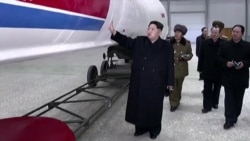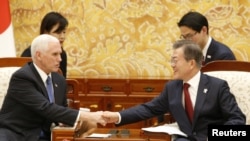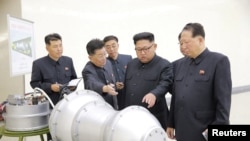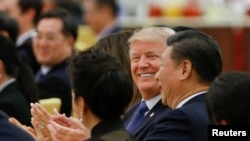U.S. President Donald Trump is expressing a willingness to talk with North Korea, but “only under the right conditions," while warning that if Pyongyang doesn’t abandon its nuclear weapons and ballistic missile programs there could be a potentially tremendous “loss of lives, numbers that nobody’s ever contemplated, never thought of.”
Trump, speaking Monday to U.S. state governors at the White House, noted North Korea’s offer in recent days, relayed through South Korea’s President Moon Jae-in that “they want to talk" to the United States.
“We’ll see what happens,” said the president, declaring that something has to be done to eliminate the threat to the United States and its allies from North Korea’s weapons of mass destruction.
At Monday’s White House briefing Press Secretary Sarah Huckabee Sanders said “denuclearization must be the result of any dialogue with North Korea.”
Talk about talks
“Both Trump and (North Korean General and intelligence chief) Kim Yong-Chul have now indicated a willingness to talk. But there is not yet agreement on what the two sides are willing to talk about,” notes Scott Snyder, senior fellow for Korea studies at the Council on Foreign Relations.
An initial U.S.-North Korea meeting would essentially be “talks about talks and the only 'condition’ that should be required is that there be a moratorium on missile and nuclear testing,” says Atlantic Council Senior Fellow Robert Manning, noting Pyongyang has not conducted any such tests for nearly four months.
The Trump administration “does not appear to have any diplomatic strategy other than demanding they give up their nukes,” Manning tells VOA. “I fear, in regard to diplomacy, the administration is a bit like the dog chasing a car. When they catch it, then what?”
As a precondition for bilateral talks, Research Professor James Przystup at the National Defense University suggests Pyongyang has to declare a moratorium on missile and nuclear tests, commit to denuclearization and implementation of the 1991 South-North Agreement on Reconciliation, Non-Aggression and Exchange.
“Anything less and we'll be getting played,” Przystup tells VOA, stressing that the only permanent end-state of negotiations has to be denuclearization.
North Korea has repeatedly insisted its nuclear weapons are not a subject for negotiation.
A "problem" to solve
According to Trump, other U.S. presidents, over the past quarter of a century “should have solved this problem long before I got here.”
In his remarks to the governors, Trump specifically criticized the Obama, Clinton and both Bush administrations. All of them “didn’t do anything,” Trump declared, saying “it would have been much easier in those days then it is now.”
The president had kinder words for China, considered North Korea's closest ally. Trump said Beijing has done more on North Korea than at any time previously, and the president credited that to his personal relationship with President Xi Jinping.
However, “Russia is behaving badly” regarding North Korea, “because Russia is sending in what China is taking out,” according to Trump.
Asked whether there would be any consequences for Russia’s action, Sanders replied: “I’m not going to weigh in ahead of time and we certainly have never broadcast what we might do, but it’s something the president does take very seriously.”
In a meeting Sunday with South Korean President Moon Jae-in, North Korea's intelligence chief, who headed his country’s delegation to the Winter Olympics closing ceremony, indicated Pyongyang’s willingness to hold talks with Washington.
"We hope constructive talks will begin between North Korea and the United States at an appropriate opportunity," said Baik Tae-hyun, spokesman of South Korea's Ministry of Unification on Monday.
General Kim was in the same VIP box for the sporting event’s closing ceremony in Pyeongchang with the U.S. official government delegation, led by President Trump’s daughter, Ivanka, and which included the uniformed commander of the American and U.N. forces on the Korean peninsula, U.S. Army General Vincent Brooks.
“There was no interaction with the North Korean delegation. The U.S. presidential delegation's attendance at the closing ceremonies was the culmination of a successful trip where we celebrated the Olympic Games, U.S. athletes and our strong alliance with South Korea,” according to a senior U.S. administration official.
Earlier, North Korea’s foreign ministry issued a warning about the imposition of the latest announced U.S. sanctions against Pyongyang.
“As already proclaimed many times, we will regard all blockades as an act of war against us, and we will never try to stop the United States, if it really has pluck to confront us ‘roughly,’” said a foreign ministry spokesman, who was quoted by the Korean Central News Agency.
“In countering precisely this intimidation from the United States, we have possessed nuclear weapons, the treasured sword of justice, to defend ourselves,” the statement added.
Trump announced on Friday what he called the “largest ever” set of sanctions against North Korea and threatened a “phase two” if the measures aren't effective.
The sanctions target one person, 27 companies and 28 ships registered in China and seven other countries with the intent of eliminating North Korea’s illicit shipping and trade. They block assets held by the companies in the United States and prohibit U.S. citizens from interacting with them.
China responded angrily Saturday to the new sanctions, maintaining they are counterproductive to efforts to halt Pyongyang's nuclear and long-range missile development programs. China's foreign ministry also demanded the U.S. immediately lift the sanctions "to avoid harming bilateral cooperation in the relevant area."
Speaking to reporters on Monday, Sanders said “we are watching closely who joins us in fully enforcing United States’ and United Nations’ sanctions.”









